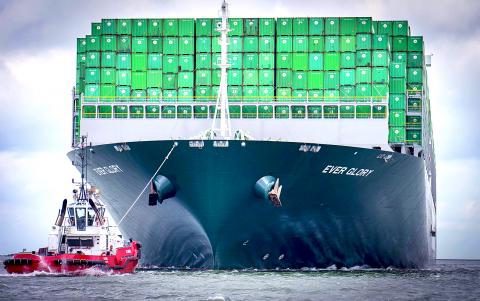A group of leading banks will for the first time include efforts to cut carbon dioxide emissions in their decisionmaking when providing shipping company loans, executives said yesterday.
International shipping accounts for 2.2 percent of global carbon dioxide emissions and the UN’s International Maritime Organization (IMO) has a long-term goal to cut greenhouse gas emissions by 50 percent from 2008 levels by 2050.
Working with non-profit organizations the Global Maritime Forum, the Rocky Mountain Institute and London University’s UCL Energy Institute, 11 banks have established a framework to measure the carbon intensity of shipping finance portfolios.

Photo: AFP
The banks involved in the “Poseidon Principles” initiative, which will set a common baseline to assess whether lending portfolios are in line or behind the adopted climate goals set by the IMO, represent about a fifth or US$100 billion of the total global shipping finance portfolio.
The results are to be published annually in individual sustainability reports and the data would be obtained by banks from borrowers under existing loan agreements.
“We are helping the shipping industry emerge into the 21st century in a responsible way,” said Michael Parker, global head of shipping at Citigroup Inc.
Those involved so far are Citigroup, Societe Generale SA, DNB ASA, ABN Amro Group NV, Amsterdam Trade Bank, Credit Agricole CIB, Danish Ship Finance A/S, Danske Bank A/S, DVB Bank SE, ING Groep NV and Nordea Bank AB.
Banks will in the longer term be more selective about which ships they include in their lending portfolios, bankers said.
“Will there be companies that will find it difficult to get finance as they have less efficient ships, yes, it will be a consequence of it — but it’s not going to be used to look for those companies and somehow find a way of getting them out,” Parker said.
Danske Bank global head of shipping Oivind Haraldsen said more institutions would join the efforts to cut the carbon footprint of the sector.
“All of us have to push — we as banks probably have more power than we are aware,” he said.

TAKING STOCK: A Taiwanese cookware firm in Vietnam urged customers to assess inventory or place orders early so shipments can reach the US while tariffs are paused Taiwanese businesses in Vietnam are exploring alternatives after the White House imposed a 46 percent import duty on Vietnamese goods, following US President Donald Trump’s announcement of “reciprocal” tariffs on the US’ trading partners. Lo Shih-liang (羅世良), chairman of Brico Industry Co (裕茂工業), a Taiwanese company that manufactures cast iron cookware and stove components in Vietnam, said that more than 40 percent of his business was tied to the US market, describing the constant US policy shifts as an emotional roller coaster. “I work during the day and stay up all night watching the news. I’ve been following US news until 3am

UNCERTAINTY: Innolux activated a stringent supply chain management mechanism, as it did during the COVID-19 pandemic, to ensure optimal inventory levels for customers Flat-panel display makers AUO Corp (友達) and Innolux Corp (群創) yesterday said that about 12 to 20 percent of their display business is at risk of potential US tariffs and that they would relocate production or shipment destinations to mitigate the levies’ effects. US tariffs would have a direct impact of US$200 million on AUO’s revenue, company chairman Paul Peng (彭雙浪) told reporters on the sidelines of the Touch Taiwan trade show in Taipei yesterday. That would make up about 12 percent of the company’s overall revenue. To cope with the tariff uncertainty, AUO plans to allocate its production to manufacturing facilities in

COLLABORATION: Given Taiwan’s key position in global supply chains, the US firm is discussing strategies with local partners and clients to deal with global uncertainties Advanced Micro Devices Inc (AMD) yesterday said it is meeting with local ecosystem partners, including Taiwan Semiconductor Manufacturing Co (TSMC, 台積電), to discuss strategies, including long-term manufacturing, to navigate uncertainties such as US tariffs, as Taiwan occupies an important position in global supply chains. AMD chief executive officer Lisa Su (蘇姿丰) told reporters that Taiwan is an important part of the chip designer’s ecosystem and she is discussing with partners and customers in Taiwan to forge strong collaborations on different areas during this critical period. AMD has just become the first artificial-intelligence (AI) server chip customer of TSMC to utilize its advanced

Six years ago, LVMH’s billionaire CEO Bernard Arnault and US President Donald Trump cut the blue ribbon on a factory in rural Texas that would make designer handbags for Louis Vuitton, one of the world’s best-known luxury brands. However, since the high-profile opening, the factory has faced a host of problems limiting production, 11 former Louis Vuitton employees said. The site has consistently ranked among the worst-performing for Louis Vuitton globally, “significantly” underperforming other facilities, said three former Louis Vuitton workers and a senior industry source, who cited internal rankings shared with staff. The plant’s problems — which have not